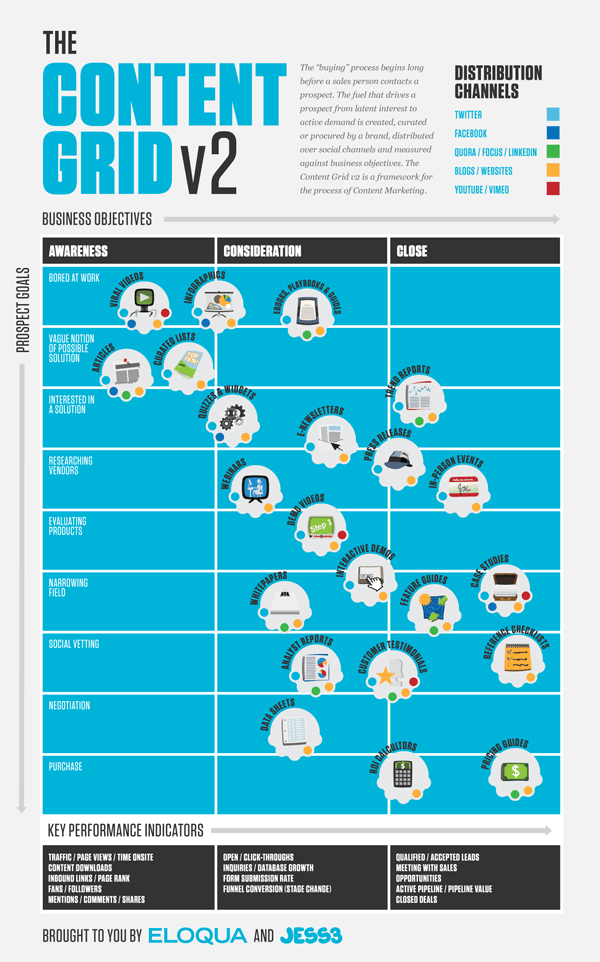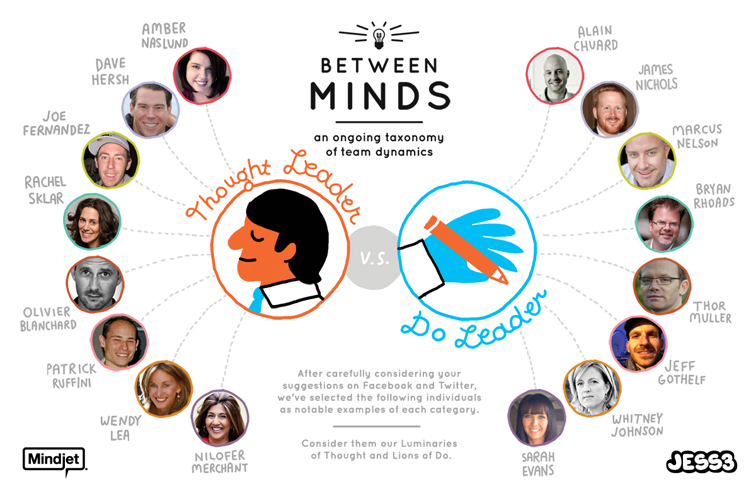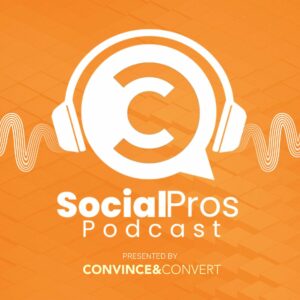Hosted By
About Social Pros Podcast:
Social Pros is one of the longest-running marketing podcasts in existence (10 YEARS and counting), and was recently recognized as the #1 Audio/Podcast Series by the Content Marketing Awards.
Our purpose? Making sure that we speak to real people doing real work in social media.
Listeners get inside stories and behind-the-scenes secrets about how teams at companies like Google, Reddit, Glossier, Zillow, Lyft, Marvel, and dozens more, staff, operate, and measure their social media programs. With 600+ episodes, the Social Pros Podcast brings the humanity of social media to the forefront, while providing incredibly useful marketing strategies that listeners can immediately implement.
Follow Social Pros on LinkedIn.
To inquire about becoming a guest or show sponsor, please email our Executive Producer, Leanna Pham, at leanna@convinceandconvert.com.
Apple Podcast Reviews:
The Social Pros podcast has quickly become a favorite in my feed! I'm consistently impressed by the engaging conversations, insightful content, and actionable ideas. I truly learn something every time I listen!
@Arlie KThis is absolutely an awesome listen for anyone in communications or social media!!
@Will31CThis podcast has become one of my staple weekly podcasts for learning about marketing! Love the conversations that they have and it's always enjoyable and educational!
@Simonstone95Love the podcast - informative, in depth and spot on for any business size.
@MissTriathlon
This is Episode 32 of the Social Pros Podcast : Real People Doing Real Work in Social Media. This episode features Joe Chernov, VP of Content Marketing for Eloqua. Read on for insights from Joe about content marketing, thought leadership, and the power of visuals. Listen Now Click the play button to listen here: [podcast]http://socialpros.podbean.com/mf/web/edime/SocialProsEpisode32.mp3[/podcast] Download the […]
 This is Episode 32 of the Social Pros Podcast : Real People Doing Real Work in Social Media. This episode features Joe Chernov, VP of Content Marketing for Eloqua. Read on for insights from Joe about content marketing, thought leadership, and the power of visuals.
This is Episode 32 of the Social Pros Podcast : Real People Doing Real Work in Social Media. This episode features Joe Chernov, VP of Content Marketing for Eloqua. Read on for insights from Joe about content marketing, thought leadership, and the power of visuals.
Listen Now
Click the play button to listen here:
[podcast]http://socialpros.podbean.com/mf/web/edime/SocialProsEpisode32.mp3[/podcast]
Download the audio file:
http://socialpros.podbean.com/mf/web/edime/SocialProsEpisode32.mp3
The RSS feed is: http://feeds.feedburner.com/socialprospodcast
Find us on iTunes: http://itunes.apple.com/us/podcast/convince-convert-blog-social/id499844469
Please Support Our Sponsors
Huge thanks to data-driven social media management software company Argyle Social for their presenting sponsorship, as well as Infusionsoft, Janrain, and Jim Kukral at DigitalBookLaunch. We use Argyle Social for our social engagement; we use Infusionsoft for our email; Janrain is our crackerjack social integration company, and Jim is our guest host for the podcast (and a smart guy).
Social Pros Transcript For Your Reading Enjoyment, Thanks to Speechpad for the Transcription
![]()
Jay: We’re back with Social Pros. It is Jay Baer, absent Mr. Eric Boggs because this is episode 32, a very special episode of the show, live from Content Marketing World 2012 in Columbus, Ohio, joined today, on the show, very special guest, content impresario, legendary content marketer, Mr. Joe Chernov. Joe thanks for being on Social Pros.

Joe: Thanks, Jay, first time I’ve been called an impresario.
Jay: Not the last I’m going to imagine.
Joe: Hopefully.
Jay: So, been a great show, right? I mean, this is the conference for content marketing.
Joe: So, last year it was the best event I attended all year.
Jay: Yeah. It was good.
Joe: Yeah. I wasn’t sure if it could live up to it this year, and it’s right there with it. I think this is a must attend show, not just for people in the content business, but anybody in any kind of modern marketing should be here.
Jay: It’s interesting. I was in a little bit of a roundtable session earlier this morning with the Content Marketing Institute folks who put on the show, and they gave us a sneak peak at some of their new research that’s coming out about the way companies are using content.
Across the board, it doesn’t matter if it’s eBooks or blogs, or skywriting, or even podcasting or Pinterest, or whatever. Content creation is up for everything, right? Everybody’s making more content. Is that a good thing?
Joe: Is an arms race a good thing, right? Like an arms race, one could argue prevents war, right? Both sides is mutually deterred to destruction. But my sense is that it’s probably in the end not a good thing, because what you’re seeing pop up now are companies that are offering content at $0.02 a word, and taglines for ads that say, “Never have to create your own content again,” as if creating content is a drag, right?
As if it’s something that you don’t want to have to do, it’s a chore. It should be a privilege. It should be something you look forward to doing, right? It’s like is talking to your wife a drag? It oughtn’t be. So, I think what we’re getting – and you mentioned this earlier in your session that I attended – a lot of kind of “check box content marketing”. So, you’re getting a lot of people that are just kind of doing the blog to do the blog.
Jay: Yeah, doing content because they feel like they need to do content.
Joe: Yeah, and it makes it harder for companies that are kind of putting their heart and soul into content, because there’s more of a cacophony to compete with, right?
Jay: Right.
Joe: It’s just harder to get heard when there’s that much noise.
Jay: Yeah. It’s interesting you talked about that, the competitive pressure. Certainly your company, Eloqua, early in the content game, well-known as an amazing content creator and distributor in the B2B space. Certainly other competitors in your world have sort of picked up that baton and it’s a very competitive content category.
Do you feel like we are entering this era where there’s no longer a first mover advantage for content the same way there was in social? There’s no longer a first mover advantage, and so now quality wins as opposed to being first?
Joe: I think you need one of two things. So, take our competitor space, take a company like HubSpot. They are so good at being first.
Jay: They’re relentless.
Joe: We will never beat them in this sort of real-time content creation. That’s their identity.
Jay: They’re the content Mashable.
 Joe: Exactly right. They blog three or four times a day, I can’t compete with that, and I don’t want to compete with that because that’s who they are and that’s sort of true to them. So, yeah, we were an early mover, but frankly, HubSpot was first. I’ll give credit where credit is due. We went in a different direction. We do less content, but hyper-premium content. So…
Joe: Exactly right. They blog three or four times a day, I can’t compete with that, and I don’t want to compete with that because that’s who they are and that’s sort of true to them. So, yeah, we were an early mover, but frankly, HubSpot was first. I’ll give credit where credit is due. We went in a different direction. We do less content, but hyper-premium content. So…
Jay: Deeper, yeah.
Joe: …deeper.
Jay: Production value.
Joe: More beautiful, and they will concede that point just as I concede the point that they’re faster, right? So, I think you need sort of one or the other.
Jay: Do you think that’s inherently because you have a different market position? That you’re software, in so far as that they compete with you and I think you could say that they do at some level. But your stuff is more enterprise focused and more expensive, and their stuff is less enterprise focused and less expensive, though I think there’s going to be a convergence there. Do you think that content production value should be tied at some level to whether you’re talking C-Suite or marketing director?
Joe: Eloqua is a premium brand, and I’m not implying that HubSpot is not. Eloqua is a premium brand, and so we made a conscious decision to produce premium content. HubSpot is like – they do a great job at being kind of the eyes and ears of social media for their clients, and so it really makes sense for that brand to be kind of first mover and to be fast, because I think their audience looks to them to know what’s the latest and greatest.
Jay: Kind of guidance, yeah. Interesting.
Joe: The reason why our two content marketing programs work is that they’re honest, right? I think ours is very true to who Eloqua is and I think HubSpot’s is equally true to who HubSpot is. So, I don’t really look for ideas from HubSpot. I look for ideas from Louis Vuitton. I want to be a hyper-premium brand when it comes to content.
So, I try not to get distracted by what others in our industry are doing, and instead try to find inspiration in unconventional places.
Jay: Yeah, that’s fascinating. We’ve had a conversation in the past about this notion of creating content outside of the specific pain points and questions of your customers. So we just left a session from Google about zero moment of truth and the whole premise of answer the questions that your customers have, and I certainly believe that and you do as well. I’m writing a book on it and all that.
But I have seen you at Eloqua create content that is inherently not necessarily based on questions that your customers and prospects have, sort of top of the funnel, sort of almost parallel path type of content, right?
Joe: Yep.
Jay: Like the blog tree that you guys created, which was really interesting content. You guys don’t offer blogging software. You’re not really even in the social media business per se. But yet, you create this content that is very social media driven, was picked up in a big social media way. How do you justify that? Because a lot of people would say, “That’s awesome, Joe, but it’s off strategy.”

Joe: I’ve heard that and I hear that internally, and I hear it externally and it’s a legit question. Look. We sell to marketers. Now, if we are in the room with a marketing operations professional, director of marketing ops, we’re in the room with the right person. Not everybody has that role, and marketing ops professionals, even if we’re talking to that person, they don’t exist in a vacuum. So the blog tree was created, or our “Grande Guide to Wikipedia”, right? We don’t sell Wikipedia consulting services.
Jay: There’s a business.
Joe: Right? Yeah, there is, and it’s a dicey business. But it’s a business. I try to create content, not just for our buyer, but for the person who has lunch with our buyer, or the person who sits in the cube next to our buyer, because we don’t know who our buyer is meeting with internally to discuss should they go with Eloqua or Brand X, right?
I don’t know who can accelerate or block a deal. So, what we try to do is create content kind of holistically for the marketing team, because we want to target what I call the “lowercase I influencer”. There’s no Klout algorithm that tells me that Tim in the cube next to Jim is the guy Jim really listens to.
Jay: Right, yeah.
Joe: There’s no algorithm out there for that. So, I have to kind of, on faith, create content that both Tim and Jim can identify with.
Jay: Yeah, and I think we get too hung up sometimes about personas and making it too exact and then too precise. I mean, I’m delighted that more and more companies are creating personas. I’ve been doing it for more than a decade in more of a web strategy context. But it’s great that people are gravitating toward that. But I think sometimes we treat them as inviolate, right? As this is exactly the way it is.
The reality – I think you’re right – is in a lot of companies there isn’t a content person or a CRM person and a social media person. They’re just people in marketing, and they have different jobs and they have different responsibilities. I’ve said it on this show before, and I said it in my session today. Content is fire, social media is gasoline, and we need to stop thinking of this industry as content marketing and/or social media, and think of it as marketing.
You don’t have a radio department anymore, and eventually you’re not going to have a social media department and you’re not going to have a content department. You’re going to have people doing marketing.
Joe: It’s funny that you say that because when you presented that earlier I wanted to pull you aside and say, “I…”
Jay: You’re totally wrong. I disagree with it entirely.
Joe: No. I have a similar metaphor that part. I look at it as content is gasoline and social media is the sports car. People want to ogle social media, talk about it. It’s waning a little bit, but for a long time it’s been the hot subject, right? But the sports car goes nowhere without a tank of gas.
Jay: Yeah.
Joe: So, while this is the social media podcast, I kind of view myself as in the oil business, not in the automotive business, because a really good content strategy can mask a really mediocre social media strategy, but the inverse isn’t true.
Jay: Absolutely. It’s like we said. You’re much better off using social media to promote your content as it’s supposed to promote your company, right?
Joe: Yep.
Jay: That’s how they work together, and that’s frankly a reason why we do so much content consulting and content strategy work at Convince & Convert. We very much want to have a foot in both camps. We think it makes a lot of sense, not only for our customers, but for us as a business. You look out there, there are not a lot of people that do both on the consulting side, or not that do both well. So, we try and occupy that space if we can.
Joe: Yeah. It’s a symbiotic relationship.
Jay: What else is sort of on your radar that you see materializing right now? Or sort of where do you see this content industry now versus, say, Content Marketing World 2011, which is just a year ago. But I think it’s a long time in content years.
Joe: Content years. Look. I think there are a few things. I think it’s going to be increasingly difficult for content marketers to be heard, because of what you said earlier.
Jay: Everybody’s doing it.
Joe: It’s just so much noise. So, I believe in my heart that it’s a meritocracy. It’s just more difficult for your merit to be acknowledged, right? So, I think what we’re going to see is companies still kind of one way or the other. I don’t know if you know Mindjet?
Jay: Yeah.
 Joe: Those guys are doing something fascinating where they’re kind of dumbing down, I mean it’s flatter than the infographic. So they have these little kind of snackable illustrations that, “Are you a dog person? Are you a cat person? Are you an East Coast person?”
Joe: Those guys are doing something fascinating where they’re kind of dumbing down, I mean it’s flatter than the infographic. So they have these little kind of snackable illustrations that, “Are you a dog person? Are you a cat person? Are you an East Coast person?”
Jay: Yeah, the infographic without having to scroll.
Joe: Exactly. Without having to do extensive research and take two months to go to market, they can go to market with them in a week. So, I think that’s one way to get heard because it’s participatory content. The other is something that we’re going to do is we had our content grid…
Jay: Good one.
Joe: …which was one of our more popular pieces of content, and a very meta content on content. But what we’re going to do now is really dial that up a notch and make that content grid interactive to allow people to go to a landing page and create a custom content grid based on how they approach content marketing. Then generate a personal branded version for themselves…
Jay: Very cool.
Joe: …and share it in the community. So, I think you can go kind of snackable, or you can go kind of big Thanksgiving dinner. We’re kind of going in the big meal fashion.
Jay: The other thing I see is this pervasive emphasis on visuals, which really cuts across both content and social. I wanted to ask you about that because you talked a little bit about being a premium brand. But beyond that, Eloqua has put a lot of emphasis on look and feel, on visuals in the past. Was that because it’s a premium brand and that positioning? Or is it that you really foretold where we are today, which is, look, infographics and photos and videos, it’s all superseding the written word. Like, Johnny don’t read anymore, right? We have people spending a lot of time on written blog posts, and I think there’s going to be a day when we’re like, “You know what? Give it to me…” It’s the Twitterization of content. Everything’s got to be shorter, tighter, more visual, more visceral. What do you think about that?
Joe: So, have you ever seen a Tweet and been like, “Man, they used all of the characters. I’m not going to read that one. I’m going to go to the next one”?
Jay: Can’t retweet it.
Joe: Yeah, exactly. 140 characters? Shoot, how much time do they think I have? I don’t think I foretold anything. We have a luxury at Eloqua where we create content for marketers and we ourselves are marketers. So, together with JESS3, our DataViz partner, we just said, “Let’s go the visual route,” and it was kind of just this spontaneous decision and it worked.
I would love to say that I had some epiphany and I knew this was going to happen. Sometimes you’ve just got to put yourself in a position to get lucky, and I think we kind of got lucky on that one.
Jay: That’s nice. We talked about this in the past, and I mentioned it today. I love what you have said, which is that forms are the enemy of spread. David Meerman Scott, I think, may have said that first or certainly does say it as well. That there’s a lot of thought around, “Let’s create great content for our company, but let’s make sure that it generates leads.”
If we’re going to have content then it must generate leads. That’s the only way we can justify the creation of this content. But you have said that forms and gating content really is the enemy of spread. You’re doing yourself a disservice in some cases by making people jump through sort of that lead generation form hoop to download your content. Not everybody agrees with that.
Joe: No, not everybody at Eloqua agrees with that. We’re a lead generation company.
Jay: Yeah.
Joe: In a way I was blaspheming when I went down this path.
Again, sometimes you have to be put in a position to get lucky. Here’s where this idea came from. We created a piece of content early on in our program, and I reached out to Jeremiah Owyang at Altimeter Group…
Jay: Never heard of him, just kidding.
Joe: Yeah. Who’s that guy? I said, “Is this something that you’d be interested in sharing,” and he said, “Yes, I like it. If you put a form in front of it, not only will I not share this, but I won’t share anything you ever create.” So, I didn’t intend to put a form in front of it, but you’re damn well certain I wasn’t going to put a form in front of it after that.
Jay: Yeah.
Joe: Look. What Jeremiah was saying is, “I’ve worked really hard to build a network that trusts me. If you jack that network to build your business, then you’ve just kind of betrayed my confidence.”
So to me, that was sort of the start of this, not anti-form revolution, but this assigning a goal to an individual piece of content, and then not necessarily trusting conventional wisdom when it comes to accomplishing that goal. So, if the objective for an infographic is to get people to view it, then why impede it?
Jay: Then downloads are not really – yeah. Why are we caring?
Joe: Yeah. So, but think of it laughably. Imagine if somebody said, “Jay, I’ve got this great infographic,” and you go to the page and there’s a form in front of an infographic.
It would make a great blog post on your part, right? Somebody put a form in front of a one-page asset? So, if you look at it that way, it becomes self-evident. But internally at Eloqua, it’s calling into question one of the kind of fundamental tenants of, not just the company, but the industry.
Jay: Yeah, and especially B2B.
Joe: Especially B2B, yep.
Jay: Yeah. So you talked about Eloqua, and doing a great job there, but you are moving on to different things. You are not going to be at Eloqua much longer. There’s a shocking revelation here on Social Pros. Breaking news on Social Pros.
Joe: It is breaking news in a way. I mean to the extent that it’s news at all. Yes. I’ve taken another position. I’m going to be running marketing at a mobile start-up and it’s going to be awesome. What the CEO really wants is he wants, not necessarily content marketing as a vertical function within marketing, but content-infused marketing. So, hopefully this is…
Jay: So it just becomes air in the organization.
Joe: Exactly.
Jay: It’s not a box. It’s just air.
Joe: It’s a culture. It’s a movement. It’s not a discipline or function.
Jay: It’s so funny, because I wrote a book about the culture of social business, that social needs to be part of your culture. Now you have a role, which is to make content part of the corporate culture, again this convergence of social and content and it’s all about how do all of the people in the organization look at the world, more so than what’s your job function, your reporting structure, and all that.
Joe: Yeah. So, maybe content and social isn’t so much gas and cars or gas and fire. But maybe they’re opposite sides of an A-frame house. They kind of hold each other up. I think there is a mutual reliance there. But what my hope is for Content Marketing World 2014, what you see here are people that were kind of proficient in or kind of built their reputation in content marketing, but now take over as VP of marketing in companies.
Now what you have is the kind of senior marketer in that organization comes from a content marketing background, and I think that’s how the kind of culture of content creation will be born, when there’s a kind of growing up of the content marketing professionals.
Jay: I mean, that’s certainly how the culture of digital was born.
Joe: Yep.
Jay: It wasn’t necessarily from old line marketers learning digital. It was people who grew up with digital eventually becoming managers and directors, and VPs and CMOs.
Joe: Yeah, and hopefully that’s what happens in the content marketing world, and frankly that’s why I see this transition as making a lot of sense. Not just for me, but hopefully as kind of a bell weather for the content marketing industry is that there’s a growth path.
 Jay: Well, certainly in mobile it makes a lot of sense. I mean, we’ve talked a lot about mobile in this conference. We’ll continue to. Mobile content consumption is massively on the rise, and it’s not going to go back in the bottle anytime soon. So, you’re certainly going to be on the right side of history I suspect.
Jay: Well, certainly in mobile it makes a lot of sense. I mean, we’ve talked a lot about mobile in this conference. We’ll continue to. Mobile content consumption is massively on the rise, and it’s not going to go back in the bottle anytime soon. So, you’re certainly going to be on the right side of history I suspect.
Joe: I will, so knock on wood. I’m not sure if they’re listening and can hear.
Jay: Knock on wood. I’m sure they can. It’s a good microphone.
Social Pros Shoutout
Jay: Do you have, Mr. Chernov, a Social Pros shout out for us? This is the podcast for real people doing real work in social media and content marketing. Do have somebody who is unappreciated, under-appreciated if you will?
Joe: How appropriately appreciated is April Dunford at Rocket Watcher?
Jay: Not nearly appreciated enough. That’s an excellent nomination. Tell us why.
Joe: Well, first of all, I told a friend about her and he reads her blog. He calls me up and he says, “I have a mind crush on April.”
Jay: I love that term. That’s great.
Joe: I loved it. I thought it was great. So, then a year and a half later, I reached out to him. I said, “Look. I’m taking a job as VP of marketing at a start-up. I haven’t been VP of marketing before. Is there a book out there, how to be VP of marketing?” He said, “No. But there’s this blog you have to read. April Dunford’s blog. It’s so good. She’s just a straight shooter. She tells it like it is. She’s super- smart.” I said, “You SOB. I’m the one that introduced you to that blog.”
Jay: He’d forgotten that part of it? That’s awesome.
Joe: He forgot the loop. But I think that she’s the closest thing to how to be a modern VP of marketing in a box.
Jay: That’s great.
Joe: Go to her blog and she’s got it.
Jay: Excellent. We will link that up in the show notes. Joe, thanks very much. Congratulations on the new position, fantastic to see you as always.
Joe: Likewise.
Jay: That will do it for this episode of Social Pros. We’ll be back next week, regular schedule, with me and Eric. Thanks everybody, appreciate it. SocialPros.com.







